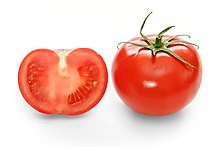Nix v. Hedden
| Nix v. Hedden | |
|---|---|
 U.S. LEXIS 2303 | |
| Case history | |
| Prior | Judgment for defendant, 39 F. 109 (C.C. S.D.N.Y. 1889) |
| Subsequent | None |
| Holding | |
| Tomatoes are "vegetables" and not "fruit" within the meaning of the Tariff Act of 1883 based on the common meaning of those words. | |
| Court membership | |
| |
| Case opinion | |
| Majority | Gray, joined by unanimous |
| Laws applied | |
Tariff Act of 1883 (Mongrel Tariff) | |
Nix v. Hedden, 149 U.S. 304 (1893), is a decision by the
Background
This section needs additional citations for verification. (May 2014) |
John Nix founded the John Nix & Co. fruit commission in New York City in 1839. The company became one of the largest sellers of produce in New York City at the time, and was one of the first companies to ship produce from Virginia, Florida, and Bermuda to New York.[2]
On March 3, 1883, President Chester A. Arthur signed the Tariff Act of 1883, requiring a tax to be paid on imported vegetables, but not fruit. The John Nix & Co. company filed a suit against Edward L. Hedden, Collector of the Port of New York, to recover back duties paid under protest. They argued against the tariff by pointing out that, botanically, a tomato is a fruit due to its seed-bearing structure growing from the flowering part of a plant.[3]
At the trial, the
During testimony, one witness testified that in regard to the dictionary definition:
[the dictionary] does not classify all things there, but they are correct as far as they go. It does not take all kinds of fruit or vegetables; it takes a portion of them. I think the words 'fruit' and 'vegetable' have the same meaning in trade today that they had on March 1, 1883. I understand that the term 'fruit' is applied in trade only to such plants or parts of plants as contain the seeds. There are more vegetables than those in the enumeration given in Webster's Dictionary under the term 'vegetable,' as 'cabbage, cauliflower, turnips, potatoes, peas, beans, and the like,' probably covered by the words 'and the like'
Another witness testified that "I don't think the term 'fruit' or the term 'vegetables' had, in March 1883, and prior thereto, any special meaning in trade and commerce in this country different from that which I have read here from the dictionaries."[4]
Both the plaintiffs' counsel and the defendant's counsel made use of the dictionaries. The plaintiffs' counsel read in evidence from the same dictionaries the definitions of the word tomato, while the defendant's counsel then read in evidence from Webster's Dictionary the definitions of the words
Decision

The court
The passages cited from the dictionaries define the word 'fruit' as the seed of plants, or that part of plants which contains the seed, and especially the juicy, pulpy products of certain plants, covering and containing the seed. These definitions have no tendency to show that tomatoes are 'fruit,' as distinguished from 'vegetables,' in common speech, or within the meaning of the tariff act.
Justice Gray, citing several Supreme Court cases (.
Legacy
Nix has been cited in three Supreme Court decisions as a precedent for court interpretation of common meanings, especially dictionary definitions. (Sonn v. Maggone, 159 U.S. 417 (1895); Saltonstall v. Wiebusch & Hilger, 156 U.S. 601 (1895); and Cadwalader v. Zeh, 151 U.S. 171 (1894)). Additionally, in JSG Trading Corp. v. Tray-Wrap, Inc., 917 F.2d 75 (2d Cir. 1990), a case unrelated to Nix aside from the shared focus on tomatoes, a judge wrote the following paragraph citing the case:
In common parlance tomatoes are vegetables, as the Supreme Court observed long ago [see Nix v. Hedden 149 U.S. 304, 307, 13 S.Ct. 881, 882, 37 L.Ed. 745 (1893)], although botanically speaking they are actually a fruit. [26 Encyclopedia Americana 832 (Int'l. ed. 1981)]. Regardless of classification, people have been enjoying tomatoes for centuries; even Mr. Pickwick, as Dickens relates, ate his chops in "tomata" sauce.
In 2005, supporters in the New Jersey legislature cited Nix as a basis for a bill designating the tomato as the official
See also
- jamclassification; Annex III(A)(1), Council Directive 2001/113/EC of 20 December 2001 relating to fruit jams, jellies and marmalades and sweetened chestnut purée intended for human consumption
- Ketchup as a vegetable
- value-added tax.
- Toy Biz v. United States – decided that action figures of certain superheroes are legally toys, not dolls
- List of United States Supreme Court cases, volume 149
References
- ^ Nix v. Hedden, 149 U.S. 304 (1893).
- ^ "Virginia Truck Farms: How They Supply Food For The Great Cities". Fruit Trade Journal and Produce Record. 56: 14. January 20, 1917. Retrieved October 4, 2016.
- ^ "Garden Tomato - Solanum lycopersicum - Overview - Encyclopedia of Life". Encyclopedia of Life. Retrieved July 30, 2017.
- ^ 149 U.S. at 305.
- ^ "Are Tomatoes Fruits or Vegetables?". June 9, 2010. Retrieved July 30, 2017.
- ^ Dewey, Caitlin (October 18, 2017). "The obscure Supreme Court case that decided tomatoes are vegetables". The Washington Post. Retrieved February 8, 2024.
External links
 Works related to Nix v. Hedden at Wikisource
Works related to Nix v. Hedden at Wikisource- Text of Nix v. Hedden, 149 U.S. 304 (1893) is available from: Findlaw Justia Library of Congress
- Rocknel Fastener, Inc. v. United States – 34 page PDF covering a similar case hinging on the difference between screws and bolts. The difference is outlined in a 21-page PDF Distinguishing Bolts From Screws.
